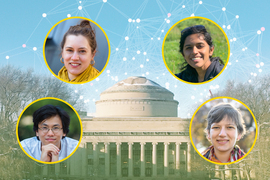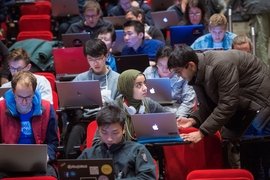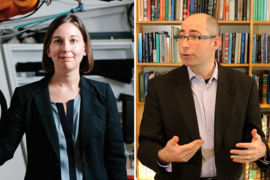Caspar Hare and Georgia Perakis have been appointed the new associate deans of the Social and Ethical Responsibilities of Computing (SERC), a cross-cutting initiative in the MIT Stephen A. Schwarzman College of Computing. Their new roles will take effect on Sept. 1.
“Infusing social and ethical aspects of computing in academic research and education is a critical component of the college mission,” says Daniel Huttenlocher, dean of the MIT Schwarzman College of Computing and the Henry Ellis Warren Professor of Electrical Engineering and Computer Science. “I look forward to working with Caspar and Georgia on continuing to develop and advance SERC and its reach across MIT. Their complementary backgrounds and their broad connections across MIT will be invaluable to this next chapter of SERC.”
Caspar Hare
Hare is a professor of philosophy in the Department of Linguistics and Philosophy. A member of the MIT faculty since 2003, his main interests are in ethics, metaphysics, and epistemology. The general theme of his recent work has been to bring ideas about practical rationality and metaphysics to bear on issues in normative ethics and epistemology. He is the author of two books: “On Myself, and Other, Less Important Subjects” (Princeton University Press 2009), about the metaphysics of perspective, and “The Limits of Kindness” (Oxford University Press 2013), about normative ethics.
Georgia Perakis
Perakis is the William F. Pounds Professor of Management and professor of operations research, statistics, and operations management at the MIT Sloan School of Management, where she has been a faculty member since 1998. She investigates the theory and practice of analytics and its role in operations problems and is particularly interested in how to solve complex and practical problems in pricing, revenue management, supply chains, health care, transportation, and energy applications, among other areas. Since 2019, she has been the co-director of the Operations Research Center, an interdepartmental PhD program that jointly reports to MIT Sloan and the MIT Schwarzman College of Computing, a role in which she will remain. Perakis will also assume an associate dean role at MIT Sloan in recognition of her leadership.
Hare and Perakis succeed David Kaiser, the Germeshausen Professor of the History of Science and professor of physics, and Julie Shah, the H.N. Slater Professor of Aeronautics and Astronautics, who will be stepping down from their roles at the conclusion of their three-year term on Aug. 31.
“My deepest thanks to Dave and Julie for their tremendous leadership of SERC and contributions to the college as associate deans,” says Huttenlocher.
SERC impact
As the inaugural associate deans of SERC, Kaiser and Shah have been responsible for advancing a mission to incorporate humanist, social science, social responsibility, and civic perspectives into MIT’s teaching, research, and implementation of computing. In doing so, they have engaged dozens of faculty members and thousands of students from across MIT during these first three years of the initiative.
They have brought together people from a broad array of disciplines to collaborate on crafting original materials such as active learning projects, homework assignments, and in-class demonstrations. A collection of these materials was recently published and is now freely available to the world via MIT OpenCourseWare.
In February 2021, they launched the MIT Case Studies in Social and Ethical Responsibilities of Computing for undergraduate instruction across a range of classes and fields of study. The specially commissioned and peer-reviewed cases are based on original research and are brief by design. Three issues have been published to date and a fourth will be released later this summer. Kaiser will continue to oversee the successful new series as editor.
Last year, 60 undergraduates, graduate students, and postdocs joined a community of SERC Scholars to help advance SERC efforts in the college. The scholars participate in unique opportunities throughout, such as the summer Experiential Ethics program. A multidisciplinary team of graduate students last winter worked with the instructors and teaching assistants of class 6.036 (Introduction to Machine Learning), MIT’s largest machine learning course, to infuse weekly labs with material covering ethical computing, data and model bias, and fairness in machine learning through SERC.
Through efforts such as these, SERC has had a substantial impact at MIT and beyond. Over the course of their tenure, Kaiser and Shah have engaged about 80 faculty members, and more than 2,100 students took courses that included new SERC content in the last year alone. SERC’s reach extended well beyond engineering students, with about 500 exposed to SERC content through courses offered in the School of Humanities, Arts, and Social Sciences, the MIT Sloan School of Management, and the School of Architecture and Planning.









